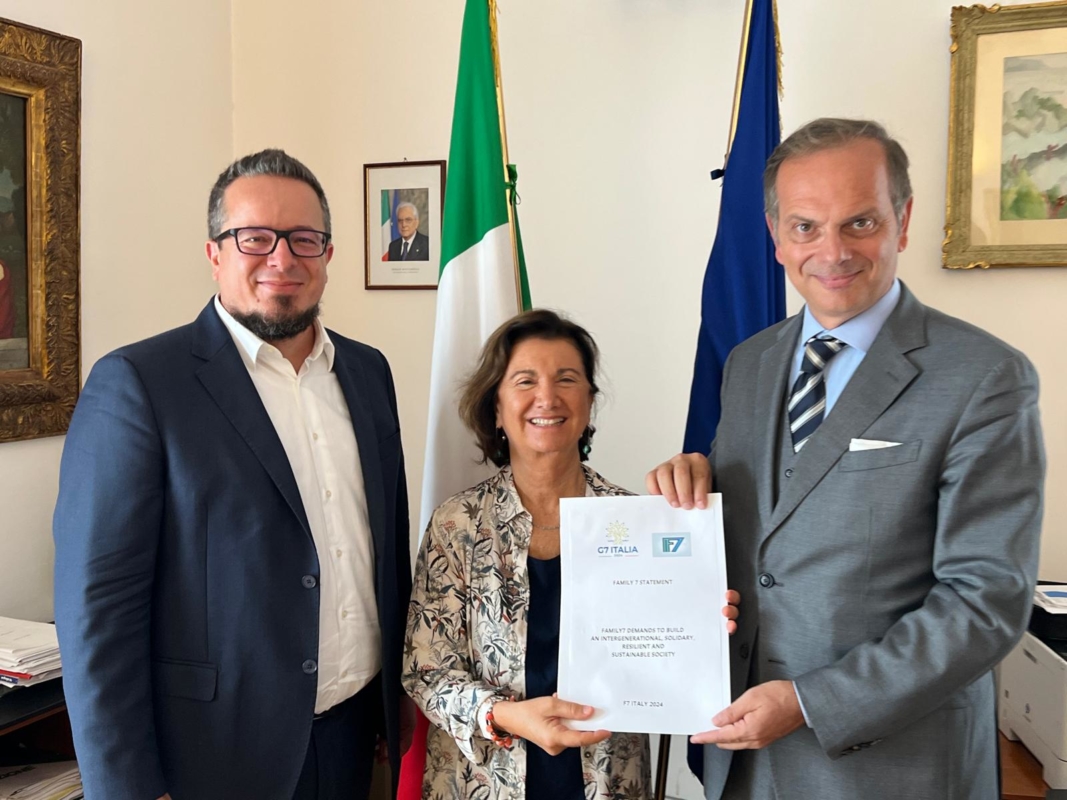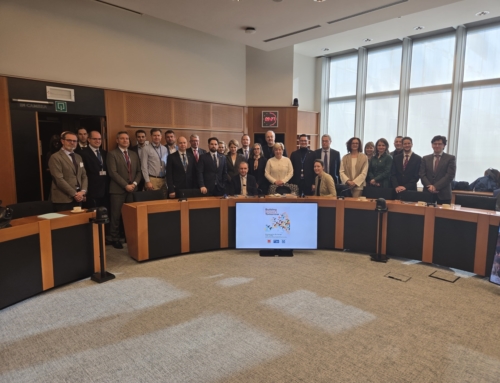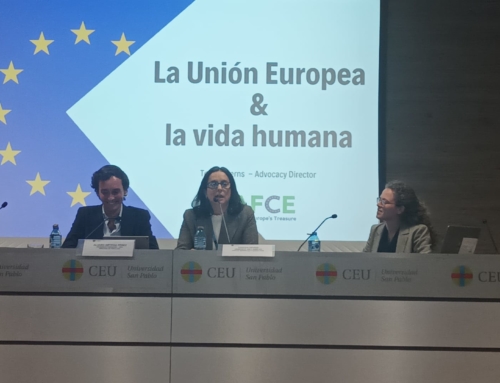Brussels, the 24th of September 2024
FAFCE has co-founded the Family 7 (F7) in collaboration with seven prominent organisations, one from each of the G7 states. Today in Rome, the President of FAFCE, Vincenzo Bassi (right), and President of Forum delle Associazioni Familiari and F7 co-signatory from Italy, Adriano Bordignon (left), met with Italy’s Minister for the Family, Natality and Equal Opportunities, Eugenia Roccella (quote below). This comes after the F7 statement was presented to a Ministerial Meeting of the Italian government.
This year the Presidency of the G7 is held by Italy. Consisting of France, the United Kingdom, Japan, Canada, Germany, the United States, and host nation Italy (and, of course, the EU as the non-enumerated member), the G7 discusses and coordinates on policies of international interest including trade, climate change, and security. The F7 statement presents the demand that “we need an international recognition of the function of the family”.
The next G7 summit will focus on Equal Opportunities and it is scheduled for 4th, 5th and 6th October in Matera. F7 hopes that the statement will inform leaders in their conversations and decision-making, prioritising the areas of policy which will lead to more equality of opportunity, sustainability, and inclusivity.
The statement rests on five areas of policy focuses:
- Empowering women in the economy
- Unpaid care work
- Demography
- Sustainable development
- Social inclusion
The declaration reflects the beliefs of the representatives of the seven countries of the G7. These organisations are not all Catholic or Christian, but rather a diverse coalition of groups who share a platform that recognises the need to protagonise the family. Those partner organisations who form part of the F7 include:
- IFFD Canada
- Confédération nationale des Associations Familiales Catholiques (CNAFC) – France
- Familienbund der Katholiken (FDK) – Germany
- Forum delle Associazioni Familiari – Italy
- Japan Family Development Association – Japan
- Home Renaissance Foundation – UK
- The Institute for Family Studies – USA
- FAFCE – Fédération des Associations Familiales Catholiques en Europe
The statement relates particularly to the G7’s goal to “make our communities stronger and more cohesive”.
FAFCE President Vincenzo Bassi said: “We have made an unprecedented contribution to the G7. We know that the very existence of our communities, let alone their strength and cohesion, requires a strengthening of family policies, since the family is the basic cell of society.”
On the subject of peace in a context of, as Pope Francis calls, a “World War III by piecemeal”, FAFCE President Vincenzo Bassi also sees the hope that the family can bring during G7 discussions: “Without recognising the family’s function as the essential pillar of our societies, even geopolitical stability and peace are in danger. As the family goes, so goes the society. Specifically, networks of families have a pivotal function for peace keeping, as families are the natural place of reconciliation and forgiveness.”
FAFCE’s key priority has been the demographic crisis, which has led to a culture of loneliness and generational imbalance. Vincenzo Bassi continues: “The family’s function is clearest in the context of the disastrous demographic winter. Plummeting birthrates and an increasingly ageing society fundamentally impact on finances, pension systems, and social cohesion. The response has to prioritise intergenerational solidarity, which begins through the family. Stronger families will help the current and next generations to prepare for a more sustainable future.”
Italy’s Minister for the Family, Natality and Equal Opportunities, Eugenia Roccella, said: “The F7 made an important contribution, both in regards to equal opportunities and the closely related topics of family and demography. Female empowerment, and in particular the freedom of women to fulfil their aspirations, without perceiving career and motherhood as incompatible options, is in fact key to the challenges we face. The Italian Presidency of the G7 very much believes in the contribution of engagement groups to the discussions in which governments are engaged. I thank F7 for focusing on the close connection between these topics that are intentionally brought together in the responsibilities of my ministry and I wish that from the Matera summit they will find new ideas for action and reflection.”









